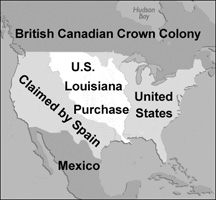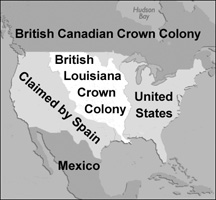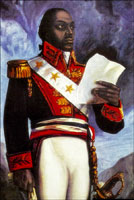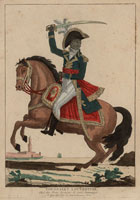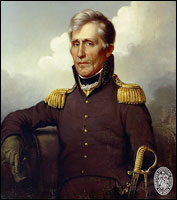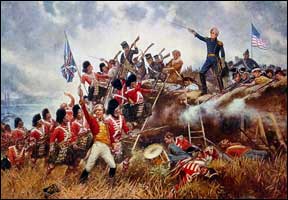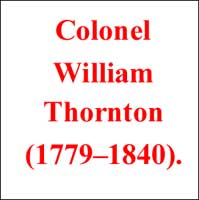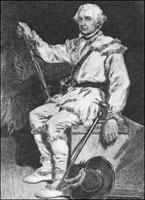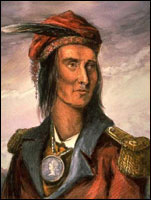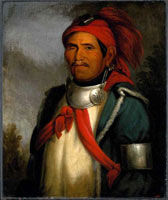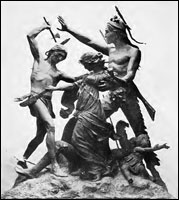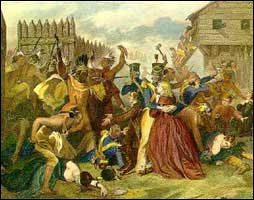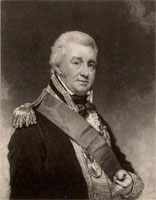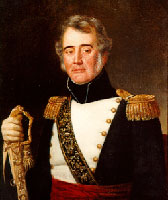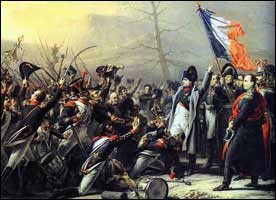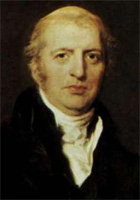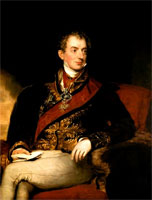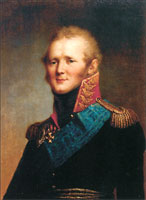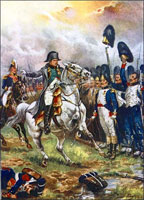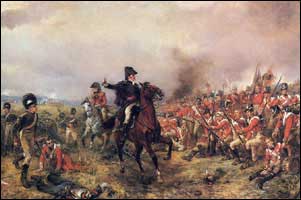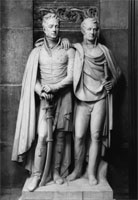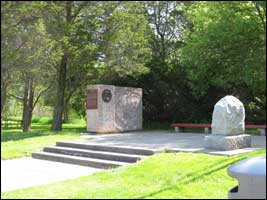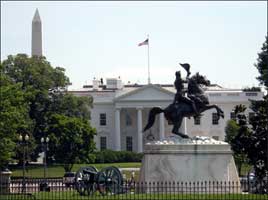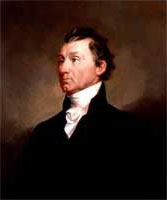The Battle of New Orleans was one of the most decisive battles in the entire history of the world–the New World equivalent of Marathon or Thermopylae.... Its outcome determined whether the Tabernacle of David, or revived Israel, would survive in the New World!! Throughout the coming year, patriotic U.S. citizens are planning a whole series of events to celebrate this great bicentennial, culminating in a grand finale of fireworks in New Orleans on January 8, 2016!! General Jackson's miraculous victory should be a worldwide celebration. With the limitless financial resources of the New World at her disposal, Britannia would have truly MISRULED the waves globally....A modern day version of ancient Tyre and Sidon.
Additionally, the British had a fort in the Oregon Territory called Fort George which was their beachhead for the conquest of California!! In 1533, Britannia was first declared an Empire when King Henry VIII found out that Emperor Constantine was British:
The mighty Mississippi River–the Father of Waters–flows through Louisiana and control of that river and its tributaries means control of the North American continent–both East and West. France controlled this vast area from 1699 until 1762. By the end of the Seven Years' War (1756–1763) it seemed certain that Britain would seize the territory as spoils of war but France ceded it to Spain to keep it out of their imperialistic hands. In October 1800, Spain ceded the territory to Bonaparte under the top secret Third Treaty of San Ildefonso.
In 1801, Toussaint L'Overture signed a secret treaty with British general Thomas Maitland. He also received arms and ammunition from the nearby island of Jamaica which was governed by Alexander Lindsay, 6th Earl of Balcarres. In 1803, bankrupt Bonaparte sold the territory to the new United States with financing provided by Barings Bank of London!! The new United States maintained a very, very precarious existence. Its new capital (Washington City) was burned to the ground in August 1814 and the entire government was in disarray. All it would take was British control of New Orleans–the Gibraltar of the West–and the Americans would be "captives within their own country."
The watchword for the British armada was "booty and beauty" or "loot and lust" as New Orleans was a fabulously wealthy city. That is what motivated the invading host with "courage" and determination. Thanks to their spies, on December 23, general Keane and colonel Thornton arrived with about 1,500 men undetected to within 8 miles (13 km) of New Orleans. Then they decided to bivouac and await the arrival of general Packenham, who was supposed to lead the conquering host into the city. That was a fatal delay as word reached general Jackson encamped a few miles above New Orleans. Our Hero was incensed and immediately issued a battle cry:
And fight them they did....Generals Jackson, Coffee, and Carroll, with about 1,000 frontiersmen, armed with rifles, swords, tomahawks, and knives, attacked the unsuspecting British as they settled down for a long winter's nap. On that night, many of "Wellington's Invincibles" slept the sleep of death and won't awaken until Resurrection Morning!! That battle saw the first use of a steamboat in combat . . . which made sailing ships obsolete....The steamboat Enterprise, captained by Henry Miller Shreve, evacuated the fearful "beauties" from New Orleans and he later resupplied Fort St. Philip with ammunition:
That
battle was Armageddon in the New World with the mighty Mississippi substituted
for the Euphrates River (Revelation 16:12).
A British spy commanded the U.S. militia on the West Bank of the Mississippi!!Unknown to general Jackson, a British spy commanded his militia on the West Bank of the Mississippi River . . . and that almost led to disaster!!
Morgan the spy was unable to communicate with Thornton, otherwise he would have advised him to concentrate his forces on the West Bank and thus obtain an easy victory. Only general Jackson's heroic defense of the East Bank saved the day. Colonel Thornton had to withdraw his men just when Morgan opened the door to New Orleans....That is why the Holy Bible says that spies are despicable!! Our great JEHOVAH fought for general Jackson as he fought for Joshua during the conquest of Canaan. The battle was brief but intense; it only lasted for about an hour, but during that time, all the British planning and scheming for the American and French Revolutions came to nothing:
According to a document found on general Pakenham after the battle, the British were to hold Louisiana until the Spanish were ready to take it back:
The sun had already set on the Spanish empire as troops under Napoleon and Wellington invaded that country. Spain would NEVER again be ready to take possession of Louisiana so that territory was to be joined to Canada and become part of the British Empire in the New World. A British victory was the precursor to a New World's St. Bart's Day Massacre!!A bloody war of extermination would have erupted on the frontier if the British occupied New Orleans–a veritable St. Bartholomew's Day Massacre!! in the New World wilderness....From their bases in Canada they had ready access to the undefended frontier.
Bloodthirsty British ally Tecumseh was a brigadier general in the British army serving under the cowardly general Henry Proctor. His fiery "preacher" brother, Tenskwatawa, gave a religious overtone to the campaign of extermination. Contrary to Kisssin' Cousins Charles Darwin, the Holy Bible says that man is to provide his food by farming . . . and not by hunting like a wild beast. The pioneers tried to bring Christianity and civilization to the Native Americans who lived by hunting and fighting. The British wanted them to remain in their primitive state in order to scalp the pioneers and collect beaver pelts!!
British control of Louisiana would have set the entire frontier ablaze with an orgy of killing and scalping....Fort Dearborn and Fort Mims were just 2 examples of the horrible fate that awaited all the pioneers.
The proud British lion limped slowly back to England and the news of the disastrous defeat reached London in late February. Napoleon's "escape" saved the British monarchy from extinction!!If the extent of the disaster became fully known to the British people, heads would roll as during the French Revolution, and quite possibly the end of the monarchy. The monarchy was saved by none other that Napoleon Bonaparte. According
to a Kentucky historian named Zachary F. Smith, the news of the disaster
reached London on February 23. The British government, led by Lord Liverpool,
went into panic mode, and their damage control department
recommended the immediate release of Bonaparte:
There are no "coincidences" in political affairs....Napoleon was suddenly "resurrected" 3 days later to divert attention from New Orleans . . . and save the throne of "mad monarch" George III.
Here is a report about the "escape" of Napoleon by a French major in general Jackson's army at New Orleans:
At the time that Napoleon was released, the Congress of Vienna had convened, presided over by the sly and cunning Prince Metternich. Metternich was impatiently waiting news from New Orleans so he coudl ratify British control over Louisiana!! As the conqueror of Napoleon, and the most powerful man in Europe, Tsar Alexander I was also "invited" to attend the Congress. This Alexander the Great was urging the delaying British delegation at Ghent to sign a peace treaty with the United States.
Tsar Alexander was then the most powerful man in Europe and his "Allies" were afraid that he would once again visit Paris with his army:
As the precursor of Adolf Hitler, Napoleon once again became the British ogre to divert attention from the disaster in the New World. The Battle of Waterloo was fought on June 18, 1815!!The Battle of Waterloo, fought on June 18, 1815, was a victory for the Duke of Wellington and his Prussian ally, Gebhard von Blücher. Casualties were tremendous on both sides, with the French losing over 41,000 men, and the British and Prussians losing about 24,000.
Incredible as it may seem, Bonaparte actually asked for asylum in England after his defeat:
That was the reason why Adolf Hitler knew he couldn't expect to retire to England but had to be content with Argentina. Napoleon's "resurrection" did distract from New Orleans and that defeat was quickly banished from the public consciousness. The plan for the British conquest of Louisiana, begun before the Seven Years' War, cost millions of lives, and an incalculable amount of money. Thanks to the incredible energy and generalship of Andrew Jackson, Satan's plans were completely defeated, and the victory was the greatest since Pharaoh's proud hosts were drowned in the Red Sea. In 1821, Mexico became a "republic" and claimed all the territory of the now defunct Spanish North American empire!!
After the British burned the White House in August 1815, Secretary of War John Armstrong resigned in disgrace and President Madison apppointed James Monroe as his successor. James Monroe then appointed general Andrew Jackson head of the U.S. militia. That appointment saved the nation from the British armada. The British are still in violation of the Monroe Doctrine!!The great task of expelling the British from the New World, so nobly begun by general Jackson and his brave militia, is still not complete. As long as the British control Canada, this Republic will continue to be the focus of intense spying, industrial espionage, and weather warfare. As President, the overriding concern of James Monroe was the safety of the New Republic in the Wilderness. His policy, which became known as the Monroe Doctrine, became a cornerstone of U.S. foreign policy, and was designed to prohibit any foreign country from ever again interfering in the affairs of the New World Republics.
Here is a brief excerpt from the Monroe Doctrine:
After the Civil War, Canada was invaded and forcibly annexed to the Britain Empire by Colonel Garnet Wolseley. During the Civil War, New Orleans was actually controlled by the British Confederacy for 2 years. Before that bloody conflict, only 2 national holidays were celebrated: January 8 and July 4. Most patriotic people still celebrate the 4th but January 8 has been dropped due to intense British propaganda. They are working on eliminating the 4th right now. It's time that all liberty-loving people restore and celebrate this great anniversary once again. Vital links References Buell, Augustus C. History of Andrew Jackson: Pioneer, Patriot, Soldier, Politician, President. in 2 volumes, Charles Schribner's Sons, New York, 1904. Drez, Ronald J. The War of 1812: Conflict and Deception. Louisiana State University Press, Baton Rouge, LA, 2014. Winston. Patriotic Fire: Andrew Jackson and Jean Laffite at the Battle of New Orleans. Alfred A. Knopf, New York, 2006. Gash, Norman. Lord Liverpool: The Life and Political Career of Robert Banks Jenkinson, Second Earl of Liverpool. Harvard University Press, Cambridge, MASS, 1984. Harvus, Antonina. Helena of Britain in Medieval Legend. D.S. Brewer, Cambridge, England, 2002. Jortner, Adam. The Gods of Prophetstown: The Battle of Tippecanoe and the Holy War for the American Frontier. Oxford University Press, New York, 2011. Latour, Major A. Lacarriere. Historical Memoir of the War in West Florida and Louisiana in 1814–1815. John Conrad & Co., Philadelphia, 1816. Palmer, Alan. Alexander I Tsar of War and Peace. Harper & Row Publishers, New York, 1974. Smith, Zachary, F. The battle of New Orleans, including the previous engagements between the Americans and the British, the Indians, and the Spanish which led to the final conflict on the 8th of January, 1815. J. P. Morton Company, Louisville, Kentucky, 1904. Sugden, John. Tecumseh's Last Stand. University of Oklahoma Press, Norman, OK, 1985. Unger, Harlow Giles, The Last Founding Father: James Monroe and the Nation's Call to Greatness. Da Capo Press, New York, 2009. Copyright © 2015 by Patrick Scrivener |
